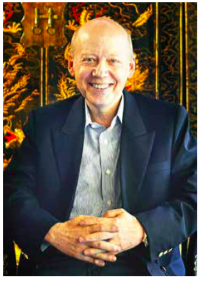
Meet the Expert - Chritopher Runckel

As the first US diplomat sent to Vietnam after the American War, Christopher Runckel has developed insights on Vietnamese politics for over 20 years. One of his biggest interests in the region? Education.
How did you get involved with education in Vietnam?
Well, when I came here to establish the diplomatic relationship, I helped establish the embassy in Hanoi and get back all the land the US government had owned.
In 1999, I decided to take early retirement with my wife, and we started a business, Business in Asia (business-in-asia.com), and one of our largest focuses was on Vietnam.
One of our biggest sectors that we always focused on was education, because we believed that there was a real need for it here, and Vietnamese parents value education so much more than most others in Southeast Asia. We’ve done quite a lot of education projects over the last 18 years.
Can you describe some of those projects?
Portland State University established a program with Intel called the Intel Scholars program. Intel sent four cohorts to Portland State to top off their engineering skills. My wife and I were also instrumental in the set-up of Eastern International University (EIU) in Binh Duong.
What we found out in the process was that Vietnamese engineers were just as good as American engineers in hard skills. Where they had challenges was in soft skills.
What we found out in the process was that Vietnamese engineers were just as good as American engineers in hard skills. Where they had challenges was in soft skills.
Skills like meeting as a group together, working as a group together, being assertive, asking questions. Don’t just sit there and listen and don’t say anything.
America has a lot of ties to Vietnam in terms of education. Are there any other countries that have a big impact on education here?
A lot of students go to Australia. UK is very big here as well. Canada is increasing. And unfortunately I’m a little bit [concerned] about Donald Trump and his policy on immigration. All they’re talking about, really, is enforcing the law. I’m in favour of enforcing the law.
But I think there’s misinformation that’s gotten out there, and I think they’ve already shook up a lot of parents.
Do you think there will be less of an urge to go to America to seek an education because of the current political climate?
We’re waiting to see.
Right now, of all the countries that send students to the US, Vietnam is number six. Up from number nine last year, a 12 percent jump. And it’s about 30,000 students now [according to the latest numbers from the Student and Exchange Visitor Information System (SEVIS)] . So, there’s a lot of room for growth.
What are some future developments in education you’re aware of in Vietnam?
There’s a lot of development going on. I want to be very fair to Vietnam.
I think if you look at MOET, MOET has done a good job at basic education. If you look at learning to read and write, basic literacy Vietnam has done an excellent job.
If you look at it in terms of pay for teachers and in terms of infrastructure, putting money into better classrooms, better schools, they’re not so good. A lot more could be done.
Current issues are management of higher education: unclear vision, slow in changes and innovation, slow empowerment for universities, corruption and wasted money on trivial projects. One of the things that I think has held them back is, where is the money coming from? There’s not enough money to go around.
And so, what’s happened, a lot of that money has gone into infrastructure, bridges, ports, because they wanted to create jobs. I’m not so sure that that was the best use of money.
It seems like most of the international educational foundations focus on STEM fields. How about humanities education in Vietnam?
Humanities are not properly valued, in my view. Also, I don’t think in Vietnam, the government is not focused enough on producing enough scientists that the society needs.
You have too many people who have marketing or business degrees. So I think there’s a lack of balance with the needed skills, what the economy needs and what’s being produced right now.
Many seem to be going abroad for education. Do any foreign students ever come to Vietnam to study?
Yeah, we are. Actually, it’s interesting.
In Eastern International University (EIU), the whole business program is taught in English. They have a very big English-language training program there, and they have students coming in from Japan, from Korea, from Cambodia, Laos, Thailand because they have more native speakers teaching them than they can get back in Japan.
And I think that’s just incredible. We also see some students coming out here, usually to get cultural training and learn Vietnamese – this is a big area for more US-Vietnam involvement.

WWW.BUSINESS-IN-ASIA.COM
Follow us on Twitter: @InsightNewsAsia
Copyright © 2016: Runckel & Associates, Inc
Visit our other website: Asia-Art.net


|
|